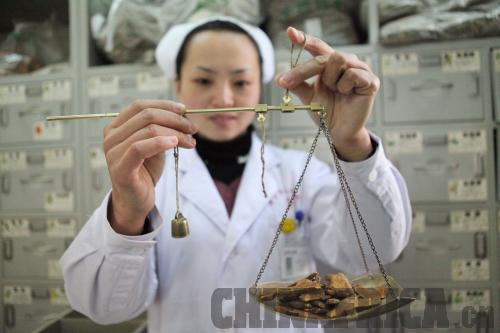|
 |
|
BALANCED: TCM is being widely promoted in Africa LIU QINLI |
Another Tianjin-based drug maker, Tasly Group, also actively integrates local African societies by developing an extensive business network. Its core product, Compound Danshen Dripping Pill, a Chinese herbal treatment for angina and coronary heart disease, has grown to be very popular in Africa.
The company's trade volume is now up to $80 million a year in Africa. With the expansion of its business, it has established about seven subordinate companies, 20 branch offices and 200 franchised stores in South Africa, Botswana, Namibia and Mozambique. This has been done to guarantee a sufficient and timely supply at lower costs.
In the long run, this will also help more Chinese enterprises that are involved in Africa to develop through greater cooperation, said the President of Tasly Yan Xijun.
Aiming to define the TCM technologies and culture, the Tasly and Tianjin University of Traditional Chinese Medicine jointly held a two-week training course on TCM and medical plants last November at the University of Nairobi, Kenya.
It has also been working on holding thousands of health lectures in Southern Africa since 2002, with millions of audiences involved.
Likewise, a forum on TCM in Africa was held in Johannesburg, South Africa last August, mainly organized by Tasly. A major outcome of the forum is that China and Ghana have entered into an Agreement upon Collaborative TCM Development. China plans to help Ghana establish the examination and approval system for TCM, so as to allow more high-quality TCM products to enter the West Africa market, according to the agreement.
TCM challenges
China's exports of traditional medicines to Africa have remained at a disproportionately low level compared to the otherwise rapidly expanding bilateral trade. For example, official statistics shows that the export of TCM to South Africa currently accounts for only 3.2 percent of the total medicine and health products exported to the country.
Many restrictions in the African market have made sales of TCM difficult. The majority of African countries use Western drug standards and procedures for entry inspections and, sometimes, levy high tariffs on herbal medicines because of doubts over effectiveness, experts said.
To counter this, moves have been made to make Chinese medicine more acceptable to overseas consumers. In August 2010, the Ministry of Health launched an industry-university alliance to promote TCM in the global market.
The alliance aims to introduce international standards to the domestic manufacturers of TCM. This will help pave the way for easier registration in overseas markets.
Registration and consumer acceptance are key for TCM to go global, noted Tan of the China Chamber of Commerce for Import and Export of Medicines and Health Products. |